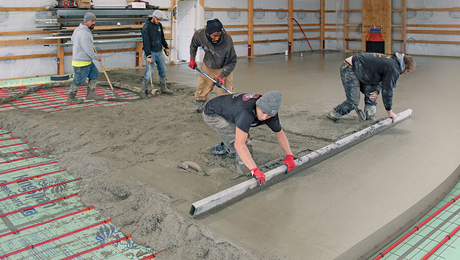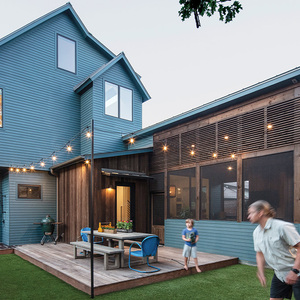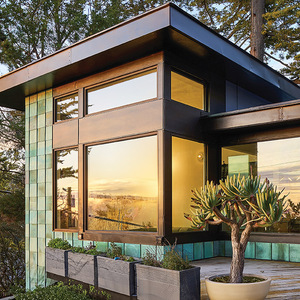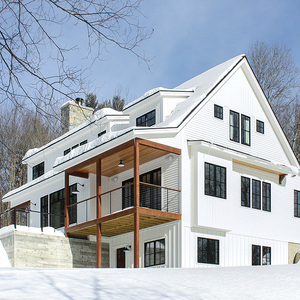TWO WATER HEATERS IN SERIES OR ONE BIG ONE?
Given my large family I need more water heater capacity and to save water loss I’m thinking about locating one at each end of the basement beneath where the bathrooms are located. What is the advisability of plumbing two water heater in series? (Running the hot out to the cold in of the 2nd heater). One bathroom has a higher demand than the other and this would appear to allow the hot water demand to draw from both heaters. Or would I be better off to install one really big one, like a Marathon 105? Thanks for any advice, Jim in North Carolina.



















Replies
I missed something ...
You want to put one heater at each end of the house, close to the demand ... good idea.
You want to link them hot-out to cold-in. Why? Doesn't that mean the hot has to travel the length of the house? What did you gain?
"Put your creed in your deed." Emerson
"When asked if you can do something, tell'em "Why certainly I can", then get busy and find a way to do it." T. Roosevelt
Right now there is one water heater at one end of the basement. We waste cold water at the opposite end two bathrooms waiting for the hot water to show up. By locating a 2nd water heater underneath these bathrooms we would waste less cold water. But we would likely still occasionally run out of hot water with just one water heater serving these 2 bathrooms (6 people plus a whirlpool). Plumbing the 1st water heater into the 2nd would give additional hot water capacity. What would be wasted would be the energy lost as hot water cools while moving from the 1st water heater to the 2nd. I could reduce this loss by insulating the pipe.But there must be technical considerations about plumbing 2 water heaters in series.Thanks, Jim
I've seen lots of new homes in this area with two water heaters plumbed in series. I didn't know they could make water heaters that cheap. Twice as many heating elements lit up at once means that it will keep up with some very long showers - and have electric bills to match.
If you go the route of two water heaters have them plumbed so you can bypass one of them in case one goes out and you can still have hot water.
Something else to think about.....What about the on-line systems? You can have instantaneous hot water with no waste. I don't know the pros and cons of one but sounds like you could use one or two of them.Semper Fi
"To be young and a conservative, you have no heart"
"To be old and a liberal, you have no mind"
Winston Churchill
"Some people spend an entire lifetime wondering if they made a difference. The Marines don't have that problem."PRESIDENT RONALD REAGAN, 1985
What about a tankless water heater.
my vote is for a recirculating hot water system on a timer, if the standard 50 gallon water heater is big enough, you didn't say how big of a water heater you have now. if you have one 40 now, a 50 and added capacity of recirc might just do it. you just do a very detailed job of insulating the pipes and you increase the storage capacity and eliminate the wait for hot and waste of cold water.
the other thing that jumps to mind is a solar water heating system, which is basically two water heaters right next to each other, one hooked to the heating element on the roof, and the other plugged in, they are hooked together(lots of details here left out), with the electricity kicking in when the solar fades. you still need the recirc system with this, and higher up front cost, but your application may be ideal for it in that the major part of most peoples utility bill comes from making water hot.
if your family is using lots of hot water, your payback on solar hot water will come that much quicker.
I have run the scenario past my plumbers quite a few times. each time they answer the same.Two standard (50-52 gal) heaters will be less expensive than one large one. Matter of supply and demand from the manufacturers view point, 52 gal is a commodity item so cheaper .
Philosophically, this is a bad idea. With two heaters vs a big one, you have more surface, or "radiating" area for heat loss. Remember, these are essentialyy storage heaters, so the closer you can get to a spherical shape 9maximum volume with minimum surface area), the less loss you'll have.
I don't know what the breakdown is between heating the water as it actually gets used, versus maintaining the water temperature all night and when you're at work.
I'll bet that static heat loss (when you're not using the heater) is a significant, if not dominant part of your yearly cost.
Having said all this, I've installed a couple of dual HWH systems for clients, and they've been thrilled, but all the plumbers I've used have recommended parallel systems, with the reason being redundancy. Series just means the first heater is always working harder, and when it dies, the client is down. Parallel just means you valve off the dead one and live on the other one till the plumber can get there.
Forrest - putting in my two cents
McDesign.
I was thinking along the lines you were when I made my decision.. a bit of closer thought convinced me that it wasn't a bad idea to use two instead of one large one.. part of that has to do with my location..
I live in Minnesota, 6 months of the year we heat the house, heck I'll be honest sometimes it's 9 months of the year.
Any heat lost in my basement will remain inside the heat envelope and benefit the whole house. Once I consider the temp is around 70 degrees and I keep hot water at 117 degrees we're only losing 47 degrees of heat into the heat envelope. not a lot of loss..
The few weeks during the summer when heat loss from the water heater during the use of A/C is really insignificant.. I doubt my whole summers A/C bill costs $50.00 and that's on a hot summer! (last year we ran the A/C less than 3 days)
The advantages is a lower cost water heater, a back up in the event one fails, back up source and the ability to set differant temps should the need arise.
" (last year we ran the A/C less than 3 days)"I'm in MN too and I'll bet I know what three days those were! - the same three days we ran our old window unit in the basement and lived in the cool bowl below ground. I hate AC - especially when people get so used to it they get lazy and never open a window all summer long, but 100 degrees and a dewpoint of 80 and I give in.I agree about cold climate heat loss from the WH in a finished basement being almost zero when you consider the "loss" is just heating your basement.Is your castle finished yet?
NannyGee,
I live on a lake, have a superinsulated home that's a slight elevation above the lake plus I am well shaded by big trees. Thus I get cool breezes even on the most stifling days.. It really needs to be at least 95 degrees with 95% humidity for me to fire up the A/C and by midnight I want it off and the windows open..
Rather than try to cool down the mass of timbers I have room A/C in the walls above beds and when I fire them up the bed is nice and cool and by midnight too cool so I shut everything off open the windows and enjoy a pleasant evening..usually until about 10 or 11 the next day.
The exterior of the place should be finished by this fall and then I'll have a few more years of interior work to do to finish off the place.. With luck I should be able to keep doing built-ins etc, untill I die..
40gal for the kids, separate 80-100 gal for you and DW!
Brooks
do you have insulation over your hot water lines this may help also